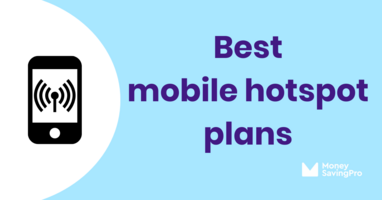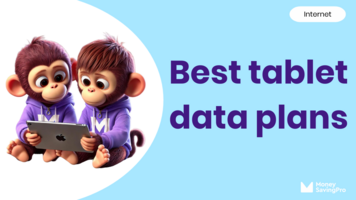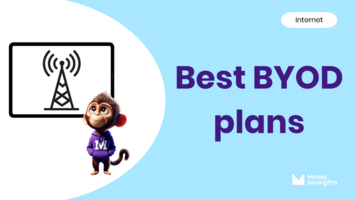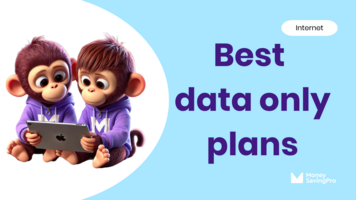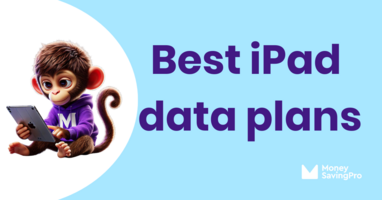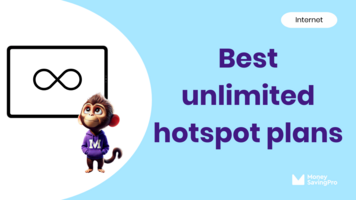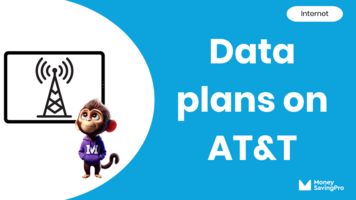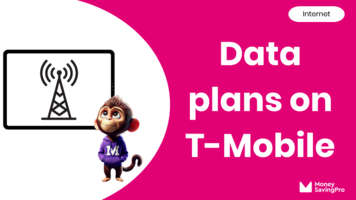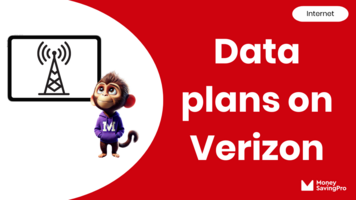Have you ever wondered how cable companies are able to constantly put their prices up, without improving their wireless technology? All while consistently scoring the lowest in customer satisfaction surveys?
The answer - give the consumer no other options.
But the good news is that with 5G home internet, there are now some real alternatives to consider.
Top 5G home internet providers
At MoneySavingPro, we are committed to presenting all the choices to our readers, so they can make the best decision for their home internet.
One of the newest developments, 5G home internet, has expanded the historically limited options when it comes to internet in your home. Increased competition is driving prices down and giving more opportunities to save.
After researching and testing out the alternatives to traditional and satellite internet, I will explore the top 5G home internet providers for 2023, discuss how to choose the best provider, compare 5G internet with other internet types, and answer some common questions about 5G internet.
So, let's dive in and find out which providers offer the best 5G home internet plans for the year ahead.
When it comes to 5G home internet, there are several providers that are leading the way in terms of speed, coverage, and customer satisfaction.
In no particular order, let's take a closer look at T-Mobile, Verizon, AT&T, and Starry, four of the top providers that offer competitive 5G internet plans for your home.
T-Mobile 5G home internet
$55 per month
Fast download speeds (245 Mbps)
No data limits
Free equipment: Gateway device with Wi-Fi 6 (pay $370 if not returned upon cancelation of service)
Easy self-install: no waiting around for professional installations
Pros
Available to over 50 million household nationwide
No price hikes, contracts or hidden fees
More unthrottled data than its competitors
Autopay discount - $5 per month
Bundling discount - about $20 per month with Go5G and Magenta Max
15-day trial period
Cons
$35 connection fee
4G coverage area is spotty
Only one plan option that uses low-band 5G instead of millimeter wave - speeds may be a bit slower for gaming and 4K video streaming
Data prioritization of mobile customers over internet users
Credit check required
Verizon 5G home internet
5G Home Plus - $80 per month
Higher speeds downloads
Ultra HD 4K video streaming available
Equipment included: Wi-Fi 6 router and 5G receiver
3-year price lock
Verizon Cloud Unlimited access
5G Home - $60 per month
High speed downloads
1080p HD video streaming available
Equipment included: Wi-Fi 6 router and 5G receiver
2-year price lock
Pros
No contracts
No data limits
Free equipment
Easy self-setup
Price lock for 2-3 years, depending on your plan
Available in several major cities including Los Angeles, Phoenix, Chicago and Houston
Speeds up to 1000 Mbps
Cons
Not available in all areas, especially rural and remote locations
Speeds can fluctuate
Home internet users are deprioritized to mobile customers
Discounts
Discounts are available for combining services like a postpaid mobile account and home internet service.
Also discounts can apply if you sign up for autopay and paperless billing. However, this is subject to a credit check and you must have a debit card, checking account or Verizon Visa card to qualify.
Likewise, you can check if you qualify for the Affordable Connectivity Program (ACP). It's a government-funded program that can pay for a portion of your home internet bill, depending on your household income.
Starry home internet plans
Starry Connect - $15 per month
30 Mbps download & upload
Exclusively in select buildings
Starry Select - $30 per month
Fast download (100 Mbps) and upload (50 Mbps) speeds
Exclusively in select buildings
Starry 200 - $40 per month
- Ultra fast download (200 Mbps) and upload (50 Mbps) speeds
- Ideal for video calls, 4K streaming, and gaming
- 1 year price lock
Starry 300 - $50 per month
Maximum bandwidth for downloads (300 Mbps) and uploads (50 Mbps)
Best for multiple users working, streaming, and gaming simultaneously
1 year price lock
Pros
No contracts, data caps or hidden fees
Great customer service
Flat rate cost with no rental fees for equipment
No credit checks
30-day trial period
Can be used with ACP
Cons
Extremely limited availability
Connection is affected by weather changes
Why is Starry home internet different?
Starry is currently only available in a few larger metropolitan areas such as NYC, LA, Boston, and Washington, D.C. However, plans are in the works for expanding into other parts of the country including Chicago, Detroit, Indianapolis, Dallas, Seattle, San Francisco.
What makes Starry a little different from the competition is how it delivers internet to your home. It's not exactly classed as a 5G home internet because it doesn't work in the same way as other 5G home internet companies.
Starry Tridents are placed on top of the apartment or condo complex. The trident acts as a receiver of the 5G internet signals then passes it along the building's pre-existing wired network. Your free Wi-Fi hub in your unit receives the signal that way.
This setup saves Starry installation and upkeep costs, which they pass onto their customers.
They are devoted to bridging the digital divide especially for low-income, underserved communities in densely populated cities. Although Starry is committed to helping affordable housing communities in major urban centers with low-income populations, service is typically relegated to larger apartment complexes.
How to choose the best 5G home internet provider
Now that I've reviewed some top 5G internet providers, it's important to know how to choose the best provider for your specific needs. Here are some key factors to consider when making your decision:
- Coverage area: Not all areas may have 5G internet coverage, so it's crucial to check the providers' coverage maps to ensure service availability in your area.
- Download speeds: Research the download speeds that each provider offers, as speeds can vary among providers. Faster download speeds will ensure smoother streaming, faster download times, and overall better internet performance.
- Monthly price plans: Compare the price of each plan offered by different providers. Consider the cost, contract terms, early termination fees, and any potential price increases over time.
- Discounts, promotions and perks: Keep an eye out for any of these that may be applicable. Several providers offer a discount if you enroll in autopay, but read the fine print - you may be subject to a credit check. Likewise, many companies give bundling discounts, but do the math and make sure you're coming out ahead if you choose this option.
- Data allowance: Look for providers that offer suitable data plans, especially if you have multiple users or data-heavy internet activities. Avoid providers with data caps, as they may limit your internet usage. Also look to see if home internet usage is deprioritized over mobile users during network congestion.
- Customer reviews: Read over recent customer reviews to gauge customer service, network reliability, and overall customer satisfaction. Positive customer reviews can indicate a provider's commitment to delivering fast, reliable internet service.
- Contract terms: Be sure to understand the contract terms of each provider, including contract length, early termination fees, and any data cap or usage restrictions.
- Network reliability: Look for providers with a reputation for network reliability and minimal service downtime. A reliable network will ensure consistent internet service, reducing disruptions to your online activities.
- Equipment fees: Consider any equipment fees associated with the provider's service, such as modem rental fees or purchase costs. Some providers may offer free or discounted equipment as part of their plans.
- Installation process: Research the installation process for each provider. Some providers offer professional installation, while others provide self-installation options. Consider which option best suits your needs and technical abilities.
By taking into account these crucial factors, you can arrive at an educated choice and select the most suitable provider for 5G home internet that caters to your individual needs.
Compare 5G internet coverage maps
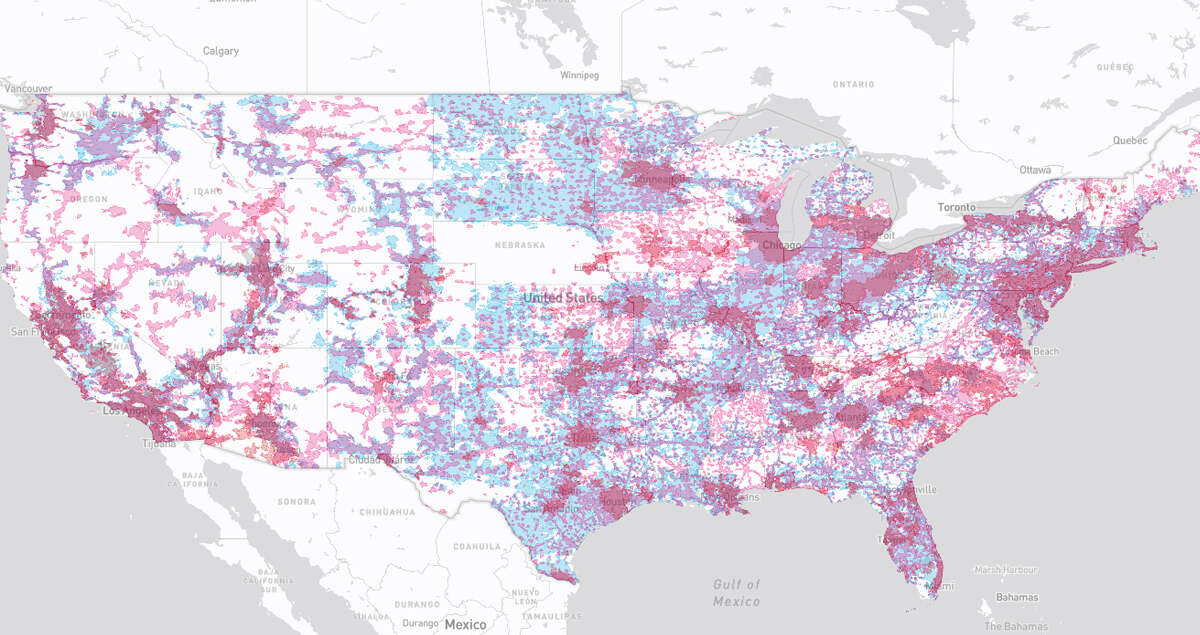
5G home internet vs other internet types
While 5G home internet is a relatively new option, it's essential to understand how it compares to other internet types, such as cable, fiber, and satellite internet.
5G home internet
Pros
- Fastest wireless internet speeds currently available, rivaling fiber internet connections
- No need for physical cables or infrastructure, making installation easy
- Can handle multiple devices and heavy internet usage without slowing down
- Low latency, providing responsive online experience ideal for real-time activities like gaming and video calls
- Potential for future advancements and improved coverage as 5G network expand
Cons
- Limited coverage areas currently, mainly available in urban areas
- Potential for signal interference from obstacles like buildings and trees
- Newer technology, so less data available about stability and reliability
Fiber internet
Pros
- Fastest internet speeds available
- Highly reliable network with minimal downtime
- Symmetrical upload and download speeds
- Can handle multiple devices and heavy internet usage without slowing down
Cons
- Limited availability in some areas
- Higher cost compared to other internet types
- Installation process may require professional assistance
Cable internet
Pros
- Widely available in urban and suburban areas
- Relatively affordable price options
- Faster speeds compared to DSL internet
- Suitable for households with moderate internet usage
Cons
- Speeds can vary depending on the number of users in the area and network congestion
- Upload speeds are typically slower compared to download speeds
Satellite internet
Pros
- Available in rural and remote areas where other internet types may not reach
- No reliance on physical infrastructure like cables or wires
- Consistent speeds, regardless of location
Cons
- Limited data allowances, which can lead to extra fees for exceeding the limit
- Higher latency compared to other internet types, resulting in noticeable delays
- Weather conditions can affect the signal strength and connection quality
T-Mobile vs Verizon vs Starry: 5G home internet
Plans & pricing
Starry, T-Mobile, and Verizon each offer different plans and price options to cater to varied internet needs. Starry, for example, offers flat rate plans with no annual contract required, providing flexibility for customers.
T-Mobile has a monthly plan at an affordable price, making it a suitable option for budget-conscious consumers.
Verizon's plans come with paperless billing, promoting sustainability.
Speed & reliability
When it comes to speed and reliability, Starry, T-Mobile, and Verizon prioritize customer satisfaction. Starry's 5G home internet delivers fast download speeds, ensuring smooth online activities.
T-Mobile's 5G home internet provides reliable connectivity, minimizing network interruptions.
Verizon's 5G home internet offers top speeds, ideal for data-heavy tasks like streaming and gaming. All three providers are committed to delivering fast speeds and maintaining network reliability.
Availability
The availability of 5G home internet may vary depending on your location and the coverage of the provider in your area. Starry's 5G home internet, for example, is available in select urban areas, providing high-speed internet options to city dwellers.
T-Mobile's coverage area is expanding, reaching more suburban areas.
Verizon's coverage area is wide, available in urban, suburban, and rural areas. It's best to check with each provider for coverage in your area.
Equipment
Starry, T-Mobile, and Verizon each offer user-friendly equipment for their home internet service. Starry provides a wireless home internet router, eliminating the need for complicated installation.
T-Mobile offers a wireless internet gateway, making it easy to set up your home network.
Verizon provides a 5G home internet modem, ensuring a seamless connection without the need for additional equipment. All three providers prioritize fast and reliable internet speeds, making their equipment designed to deliver top performance.
What do customers say?
The customer feedback for Starry, T-Mobile, and Verizon's home internet offerings is generally positive. Customers praise Starry's 5G home internet for its fast speeds and unlimited data plans.
T-Mobile customers appreciate the affordability and reliability of their 5G home internet service.
Verizon customers rave about the top speeds and wide coverage area of their 5G home internet service. Checking customer reviews can help you make an informed decision when choosing a home internet provider.
5G home internet FAQs
Yes, providers such as Verizon, AT&T, and T-Mobile now offer 5G home internet plans. However, availability will depend on your location. It's best to check to see if 5G home internet service in your area.
While 5G internet has the potential to be faster than fiber-optic internet, the actual speed may depend on factors such as network coverage and congestion.
The installation process may vary depending on the provider. Some providers offer professional installation services, while most provide self-installation options. Plug and play self-install can take about 15 minutes.
With 5G home internet, you can enjoy smooth, lag-free online gaming, download large game files quickly, and connect multiple devices without experiencing network congestion. However, it's important to consider factors such as signal strength, network coverage, and potential data caps when choosing a provider and plan.
5G home internet is perfect for streaming, offering high speeds and low latency. You can enjoy uninterrupted, high-quality video content without buffering. The speed of your 5G connection will depend on your plan and coverage area.
Use online tools like coverage maps to determine if 5G home internet is available in your area. It's important to note that 5G cell coverage doesn't necessarily mean you have access to 5G home internet. Check with your specific provider to ensure adequate coverage.
Extreme weather conditions like heavy rain or storms can cause signal interference. However, compared to older wireless technologies, 5G is designed to be more resilient in adverse weather conditions.
Recap: What is the best 5G internet service?
After extensive research, we took the following factors into consideration:
- Prices & plans
- Availability & coverage
- Speed & reliability
- Customer service ratings & feedback
Our top recommendation is T-Mobile 5G home internet service in 2023. But it's important for you to make the decision yourself.
Our goal is to give you all the options out there to make the decision for yourself about an internet provider. Whether you decide on fiber, cable, satellite, or 5G internet, we just want you to get the most bang for your buck.
If you decide to go with a 5G home internet solution, choosing the right one is crucial for a seamless experience. 5G home internet offers fast speeds and low latency, making it ideal for gaming and streaming. However, its availability may vary depending on your location.
T-Mobile, Verizon, AT&T, and Starry wireless providers are some of the best internet providers to consider in this arena.
When selecting a provider, keep factors like pricing, speed, reliability, availability, and customer reviews in mind. Our recommendation is based on our experience and expertise in the field, but ultimately the power to choose is in your hands.
Overall, 5G home internet is a viable option that rivals traditional cable internet, satellite, and fiber-optic connections. To find out if 5G home internet is available in your area, contact your preferred provider.
Internet Provider Guides
Our experience with home internet
At MoneySavingPro, we have tested various home internet providers, including Starry, AT&T, T-Mobile, and Verizon, to provide accurate and unbiased recommendations.
Our experience with Starry's 5G home internet revealed fast download speeds, no data caps, and easy setup, making it a top option for urban areas.
T-Mobile's 5G home internet provided reliable connectivity and fast speeds for multiple devices, making it a suitable option for budget-conscious consumers.
Verizon's 5G home internet exceeded our expectations, offering top speeds, wide coverage, and seamless online activities.
Our firsthand experience with these providers helps us make informed recommendations for home internet service, prioritizing customer satisfaction and quality internet service.
Why should you trust us?
As internet service experts, we have extensive knowledge and experience in the home internet provider industry.
Our recommendations are based on thorough research, customer feedback, and an understanding of the importance of fast, reliable, and affordable internet service at home.
You can trust us to provide accurate information, guiding you towards the best internet option for your specific needs.
Our goal is to ensure customer satisfaction by providing reliable, trustworthy recommendations in the home broadband provider space.



